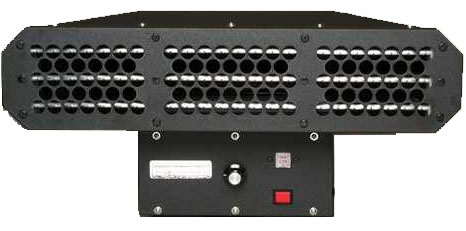ESD - Static Control
in electronics, electronic systems assembly in appliance and auto manufacturing as well as in lab applicationsSome examples of ESD ionizers are: The IT-7000, the HM-8000 and the Model 190 series & HPS-III hands free ionization guns.
Electrostatic discharge (ESD) is the release of static electricity when two objects come
into contact. Familiar examples of ESD include the shock we receive when we walk across a carpet and touch a metal door knob and the static electricity we feel after drying clothes in a clothes dryer. A more extreme example of ESD is a lightening bolt. While most ESD events are harmless, it can be an expensive problem in many industrial environments.
ESD first requires a build-up of an electrostatic charge. This occurs when two different surfaces rub together. One of the materials becomes positively charged; the other becomes negatively charged. When that charge comes into contact with the right material or ground, it is transferred and there is an ESD event. The heat from the ESD event is extremely hot, although we do not feel it when we are shocked.
However, when the charge is released onto an electronic device such as a circuit board
, the intense heat from the charge can melt or vaporize the tiny parts in the board causing the device to fail. Sometimes an ESD event can damage a device, but it continues to function. This is a called a latent defect, which is hard to detect and significantly shortens the life of the device
Many electronic devices are susceptible to low voltage ESD events. For example, hard drive components are sensitive to only 5-10 volts or less. For this reason, manufacturers of electronic devices incorporate measures to prevent ESD events throughout the manufacturing, testing, shipping, and handling processes.
Grounding and training operators are very important parts and any program to reduce
damage caused by ESD on electronics. However there are a few problems with these two approaches: 1) Non conductive materials can not be grounded. So any non conduce material can hold a change and damage an electronic device. 2) Grounding an operator who is wearing non conductive clothes gives a false sense of security. A charge on the clothes will not be grounded out. 3) People do not always do what they have been trained to do.
One method used to control ESD that is less dependent on grounding and training is ionization in the work area. Ionization for static control produces both positive and negative ions which actively reduces the static change.
To learn more about ionization and how it works for static control read "Static Electricity Cause and Effects"
Some examples of ESD ionizers are: The IT-7000, the HM-8000 and the Model 190 series & HPS-III hands free ionization guns. This equipment is very easy to use and quickly and cost effectively reduces the static electricity in the work area and on your products.
- Manufacturing parts with large amounts of plastics and other non conductive materials along side of sensitive electronics may need solutions that cover larger areas and can handle higher charges. Applications such such as manufacturing appliances, medical devices, and automotive systems will require the Model 465 Balance
Part number 90747-03210 Model 465 Balance
Another important device is the electrostatic meter or static meter which measures static electricity on surfaces.
To learn more about static electricity visit our online tutorial.

